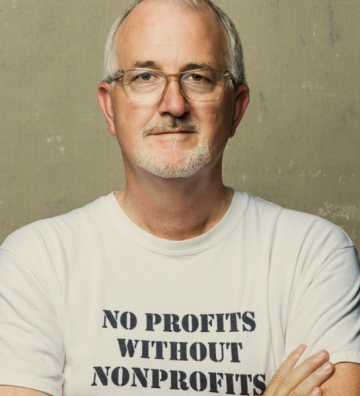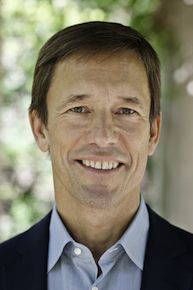We have found a new home! Kindly visit this link in our new website here: https://www.denver-frederick.com/2016/09/08/robert-egger-founder-of-the-dc-central-kitchen-joins-denver-frederick/
The founder of LA Kitchen and the DC Central Kitchen, Robert Egger, discusses his initial idea to teach homeless men and women basic cooking skills, and how that idea has blossomed into a program with huge impact— from training unemployed adults for culinary careers, to reclaiming healthy, local food that would otherwise be discarded.

The following is conversation between Robert Egger, Founder and President of LA Kitchen, and Denver Frederick, host of The Business of Giving, on AM 970 The Answer in New York City.
Denver: There are not many founders who would build a world class social enterprise, then one day leave it all behind, move 3,000 miles across the country, and start up another one. But my next guest is not your typical founder; he is Robert Egger, the Founder of the DC Central Kitchen, and now the President and CEO of LA Kitchen. Good evening, Robert, and welcome to The Business of Giving.
Robert: Thanks. It’s a real pleasure to be on.
Denver: Well, from the time you were a kid, you wanted to be Rick in Casablanca, the character played by Humphrey Bogart, open a night club, and change the world through music. But instead, you started the DC Central Kitchen in Washington. So you pivoted, Robert–long before anybody ever heard that word…outside of a few basketball coaches. Tell us how this came to pass.
Robert: Well, I was, as you suggested, a night club guy. I really dreamed–since I was very young– and wanted to be part of the social movements that I grew up watching in the 1960s. I wanted to be part of something, to contribute. As you suggested, man, I thought music was the vehicle, and I still believe it has power. But I just ended up like a lot of people in the late 1980s. The issue of homelessness became so “in-your-face” in DC, but also in every city. I thought I had to go out and do something. So one night I went out innocently to serve people on the streets of Washington and encountered the kind of charity model–which is sadly and often times wrapped up in a kind of redemption for the giver, versus the liberation of the receiver. In short, I was serving food that was purchased at the grocery store to people who were standing outside in the rain.
And so I innocently proposed an idea that eventually became the DC Central Kitchen, mainly because all the groups I went to– to try and give it to them– liked everything the way it was. That’s been a benchmark of my career. It’s that sense of: “what we’re doing is great, but it could be better! Let’s always be open to trying something new.”
I also proposed the cooking program, that in effect said: Let’s teach homeless men and women basic cooking skills… and I don’t mean people right off the street. But, let’s try and be part of a system that would start to create an exit door. And restaurants could donate food. Then they could also help teach, and would have access to entry-level people who could help them make money! Everybody would win something! That was where it started– this idea of quid pro quo.
Denver: Well, tell us a little bit about the DC Central Kitchen: what your business model was there; where you sourced your food; who you hired; and what you were able to achieve.
Robert: OK. The first time I went out, I purchased food from a grocery store, served the people outside in the rain. So I said: “Hey, look: restaurants, hotels, hospitals, universities throw away a ton of food every night.” And they hate throwing away food; they just don’t want to be sued. So, if you could find a safe, healthy way to get that food…boy, you could serve more people…better food, for less money.
Denver: Yes.
